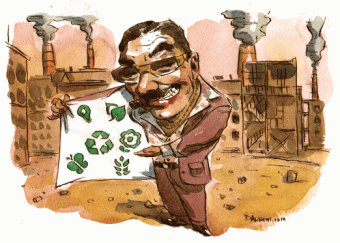Your reusable water bottle and organic shoes might have more of an impact on Mother Earth than you think.
According to Daniel Goleman, it's not easy being green, or at least it's not as easy buying green as a lot of product labels would indicate. In Ecological Intelligence: How Knowing the Hidden Impacts of What We Buy Can Change Everything (Broadway Books, 2009), the bestselling author and former New York Times science reporter argues that most of the "green" labels on our organic cotton T-shirts, recycled paper products, energy efficient printers, or phosphate-free detergents are misleading and lull us into a false security.
The problem is that these labels only focus on one or two environmental impacts of a product, even though the manufacturing, packaging, delivery, and disposal of a single item like a glass jar uses hundreds of substances provided by dozens of suppliers, involves thousands of distinct processes consuming all sorts of energy and resources, and releases more than 200 types of emissions into the atmosphere.
So a single phrase indicating that a shirt was made with organic cotton barely addresses the tip of the iceberg of a product's true environmental costs, but it does make us feel better about buying the shirt (and so many other products). And it keeps corporate sales and profits from going into the red.
In The Omnivore's Dilemma (Penguin, 2007) and The Way We Eat (Rodale, 2006), Michael Pollan and Peter Singer argue that agribusinesses and fast food corporations do everything they can to keep customers in the dark about the ethical and environmental costs of our burgers and strawberries. But Goleman puts a good deal of the blame for our ecological ignorance back on the customers, noting that we often prefer to be told comforting lies about the harms being done by our manufacturing processes and that we don't want to know the unpleasant truths about what we are doing to ourselves, our children, and our planet.
In addition, it looks like we lack ecological intelligence because our brains have evolved to respond to the sort of clear and present danger posed by a crouching tiger or a forest fire. When the threat is big, fast, and loud, our brains kick into high gear, pushing us to a fight-or-flight response. But when the danger is slow and silent, like receding glaciers, global warming, or rising tides, we sleep through the alarm.
When it comes to the environment we think like adolescents. Their underdeveloped prefrontal lobes prevent them from thinking about the long-term consequences of their actions.
The challenge, as Goleman sees it, is to provide customers with ecological intelligence and corporations with an ecological incentive. And the solution he offers is providing customers with radical transparency about the full environmental costs of the products they purchase.
The path to this radical transparency relies upon the newly developed field of "industrial ecology" and the practice of "life-cycle assessment," or LCA. Industrial ecologists are chemists, physicists, and engineers who analyze and measure the environmental impacts of all the processes and products that go into the manufacturing, packaging, shipping, and disposal of countless goods. The analysis of the entire spectrum of processes, products, and outcomes associated with a T-shirt, glass jar, or Mini Cooper is called an LCA, and it seeks to determine the true and full environmental cost of a product.
Goleman believes that if individual shoppers and purchasing agents for all sorts of organizations knew the hidden environmental costs of our purchases and were provided with alternatives that were less costly to the environment, we could shift our buying patterns toward options that were greener. If we had a clear and accurate understanding of what products were more or less green, we could bring our purchases more in line with our values and take steps that were truly green, or at least greener than what we are presently doing.
At the same time, radical transparency could provide real benefits and incentives to corporations as well. If companies could use scientifically established LCAs to show that their product was environmentally superior to their competitor's, it would give them an edge in the marketplace. As consumers become more concerned about the environment, radical transparency would allow companies with greener products to corner a larger share of the market. And it would give all companies an incentive to improve their LCA scores.
Some companies, like Coca-Cola, Wal-Mart, and the British supermarket chain Tesco, have already commissioned LCAs and are making changes to cut their environmental footprint and go a bit greener. At the same time, a growing number of websites like GoodGuide.com provide customers with LCA-based environmental and health ratings of hundreds of food and personal care items, as well as toys and household chemicals.
As Goleman sees it, the work of industrial ecologists will allow, even encourage, corporations to produce greener and greener products for an increasingly better informed and more ecologically concerned consumer base. Customers who now flock to "green" products will be drawn to companies and goods with an LCA "good earthkeeping seal," and global corporations will reverse the race to the ethical and ecological bottom by producing and marketing ever greener products.
There is much to admire about Goleman's call for radical transparency and about the ongoing work of industrial ecologists, whose work may soon provide consumers with accurate and useful information about the ecological costs of our purchases.
At the same time, reforming our global market and reversing the environmental effects of nearly two centuries of industrial manufacturing will probably also require the work of citizens. Calling for reform through a shift in our purchasing patterns is a great idea. But we will also need to petition our governments to change the way our corporations operate. When companies compete in a global market, their bottom line is to stay out of the red, and encouraging them to go green may take a little shove from the government as well. So buy green and vote green.















Add comment